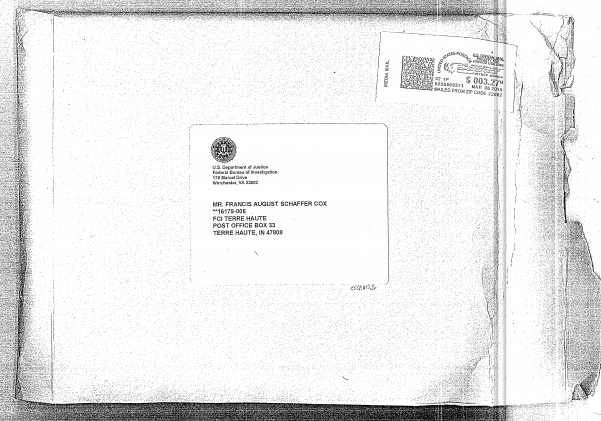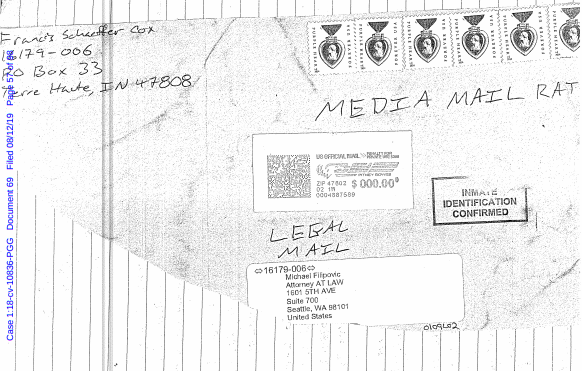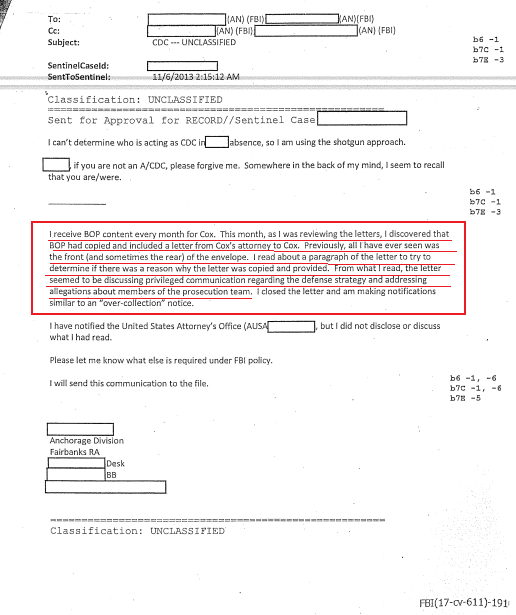Byline: By Martin Gottesfeld and Francis Schaeffer Cox
PLEASE NOTE: The authors have made this series available at FreeMartyG.com and FreeSchaeffer.com under the latest Creative Commons by-attribution commercial-use-permitted share-alike no-derivatives license.
This is part 7. Click here to read Inside the Black Sites Where Obama, Clinton, and Holder Buried Their Secrets—Part 1 of the CMU Series or click here to read Harvard Is Not God, Discredited Skeptics Say—Part 6 of the CMU Series.
“The difference between prisoners and hostages is that prisoners have lawyers and can file in court," says Cox, standing beside a sizable pile of mail.
The letters in that pile came from lawyers and were marked as attorney-client privileged. But the DOJ opened, read, scanned, and digitally preserved them anyway. Cox says that in one instance, his outgoing legal mail was returned to him inadvertently by the FBI in the envelope below rather than sent on to his attorney-after the FBI illegitimately opened it in transit.
Cox, rather than his lawyer, received his own outgoing legal mail back from the FBI in this envelope, Cox says. (FreeMartyG/Creative Commons, 2019)
“On the first day of my trial, [federal prosecutor Joseph] Bottini walked up to my attorney with a shoe box full of privileged letters I'd tried to send him in order to prepare my defense,” Cox recounts. "Bottini handed it to my attorney and said, ‘Here's the letters your client sent you.’”
On top of the DOJ having read the confidential strategic and factual insights contained in Cox's letters long ahead of his trial, Cox notes, "My lawyer needed those letters well before my trial started. They were useless to us that late in the case because he could no longer subpoena documents and witnesses."
And for every one piece of legal mail that reaches Cox, he says, an unknown number are blocked. He often learns after filing deadlines have passed that lawyers tried to contact him but were turned away by CMU administrators.
Adding to this, CMU staff refuse to mail some filings to court and other mail arrives at courthouses and law offices with obvious signs of tampering, like this envelope shard, which is all that remains of a thick package of legal mail Cox tried to send to his attorney earlier in 2019:
This razor-cut shard from an envelope is all that remains of a piece of legal mail Cox tried to send to his attorney. (FreeSchaeffer/ Creative commons, 2019)
Further, there's no way for CMU inmates to know ahead of time if what they write or say, either in their court filings or social correspondence, will trigger a harsh response. It's misleading to call it "communications management" when there is no written set of communications!
Katherine Siereveld speaks on behalf of the Federal Bureau of Prisons legal department and
she admitted on multiple occasions that the CMUs don't have written communications rules
because, she claimed, then CMU inmates might innovate unforeseen ways of saying things the FBOP doesn't like without being punished.
Yet, every passing first-year law student likely knows that due process doesn't work that way. Rules must be established in definite form before they are enforced. It's impossible, after all, to challenge an indefinite rule in court when one doesn't know it exists or can't offer its text into evidence. To some degree, though, that may be the point about how the CMUs can operate inside a department that otherwise claims it-protects free speech.
Indeed, it seems that in order to maintain appearances, the CMU handbook falsely insists that CMU inmates have the right to all the rules in the unit:
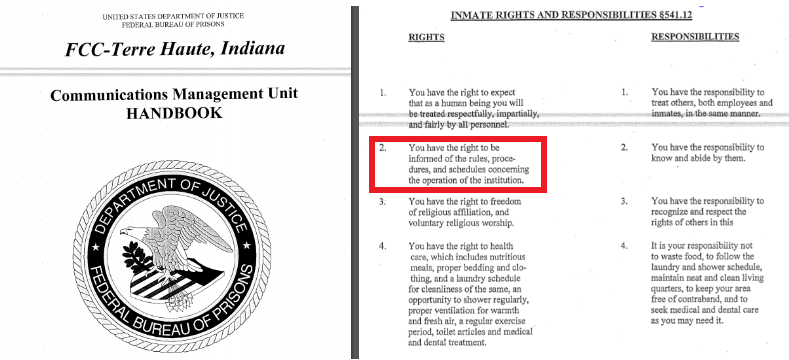
CMU inmates have the right to know all the rules in the unit, according to official documents. (U.S. Justice Department, 2019)
In reality, however, there are many unwritten, inconsistently enforced rules in the CMU. One such rule, for example, prohibits CMU inmates from using the names of other inmates in their social correspondence. Another prohibits them from filing their taxes. Still another forbids them from identifying themselves as journalists for particular publications. And new rules are regularly conjured up and then enforced after the fact.
As confusing and arbitrary as this is for the inmates in the CMUs, though, outsiders find themselves on perhaps shakier ground trying to communicate with their loved ones inside since there's no written set of rules for their inbound communications either. Further, they are almost inevitably less familiar than the inmates, with the obstacles they'll likely face.
For undisclosed reasons, for instance, Siereveld's crew blocked all communications from the head of Cox's legal defense fund for a full calendar year. The fact that this same person also carried Cox's limited power of attorney made no apparent difference to Siereveld.
“They wouldn't give her a reason [why they blocked her] because then she could've more easily challenged it in court," Cox says.
The CMU inmates resoundingly agree that Siereveld is the main force behind this lack of due process in the CMUs. They recount her blocking their access to loved ones, attorneys, courts, notaries, the press, and the DOJ's own Office of the Inspector General (OIG).
Yet, rather than architect the CMUs as due-process dead zones, Siereveld seems to have merely implemented the decades-old thought-reform program that controversial psychologist Edward Schein presented to the FBOP in 1961 under the title Man Against Man. It's also known in some circles as "the asklepieion program" (pronounced like ask-klep-ee-onn). It's a 24-point plan.
Number 18, taken directly from Scheinf’s list, consists of "Placing individuals into new ambiguous situations for which the standards are kept deliberately unclear and then putting pressure on them to conform to what is desired in order to win favor and reprieve from the pressure." Thus, the lack of due process in the CMUs appears to be an intentional technique.
Number 11 is the "Systemic withholding of mail."
Here is the full list:
1. Physical removal of prisoners to areas sufficiently isolated to effectively break or seriously weaken close emotional ties.
2. Segregation of all natural leaders.
3. Use of cooperative prisoners as leaders.
4. Prohibition of group activities not in line with brainwashing objectives.
5. Spying on the prisoners and reporting back private material.
6. Tricking men into written statements that are then shown to others.
7. Exploitation of opportunists and informers.
8. Convincing the prisoners that they can trust no one.
9. Treating those who are willing to collaborate in far more lenient ways than those who are not.
10. Punishing those who show uncooperative attitudes.
11. A systematic withholding of mail.
12. Preventing contact with anyone unsympathetic to the method of treatment and regimen of the captive populace.
13. Building a group among the prisoners convincing them that they have been abandoned by—and are totally isolated from— the social order.
14. Disorganization of all group standards among the prisoners.
15. Undermining of all emotional supports.
16. Preventing prisoners from writing home or to friends in the community regarding the condition of their confinement.
17. Making available and permitting access to only those publications and books that contain materials which are neutral to or supportive of the desired new attitudes.
18. Placing individuals into new and ambiguous situations for which the standards are kept deliberately unclear and then putting pressure on them to conform to what is desired in order to win favor and reprieve from the pressure.
19. Placing individuals whose willpower has been severely weakened or eroded into a living situation with several others who are more advanced in their thought reform and whose job it is to further the undermining of the individuals’ emotional supports which were begun by isolating them from family and friends.
20. Using techniques of character invalidation, such as humiliations, revilement, shouting induce feelings of guilt, fear and suggestibility, coupled with sleeplessness and exacting prison regimen and periodic interrogative interviews.
21. Meeting all insincere attempts to comply with cell mates’ pressures with renewed hostility.
22. Repetitive reminders from cell mates of where prisoner was in the past or is in the present, and how he may not be living up to his own standards or values.
23. Rewarding of submission and subservience to the attitudes encompassing the brainwashing objective with a lifting of pressure and acceptance as a human being.
24. Providing social emotional supports that reinforce the new attitudes.
International human-rights accords prohibit such techniques. The United States, further, has ratified some of those human-rights treaties, including The Geneva Convention (partially) and The Convention Against Torture.
To Siereveld, however, the ends seem to justify the means even if they amount to breaking international law and committing fraud upon domestic courts.
Inmates, attorneys, and others experienced with the CMUs, moreover, believe that federal prosecutors use the CMUs to sabotage appeals in cases they fear they may lose. This is especially true, many believe, in politically sensitive cases.
Many find it striking that only about 80 out of the nationwide federal prison population of approximately 180,000 are sent to the CMUs. That's roughly 0.04%. Critics point out that meanwhile, a large share of this minuscule minority has politically-sensitive cases like Cox, Reynolds, Johnson, and Warren.
FBI documents like the one below further reveal that the FBOP proactively sends information about Cox to the FBI, including copies of his privileged legal mail. These documents also show that the FBI had what it called "a concern related to COX's direct appeal of his conviction."
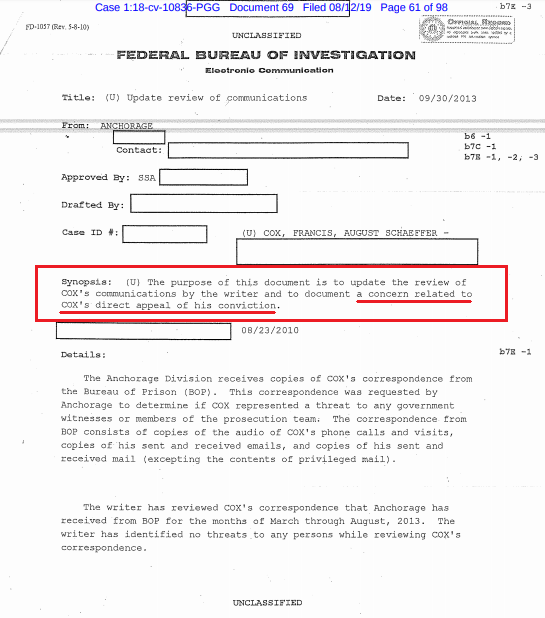
This FBI document reveals that the bureau had what it called, "a concern related to COX's direct appeal of his conviction." (U.S. Department of Justice, 2019; The document was created in redacted form in 2019 in answer to FOIA)
As noted in How the DOJ Protected Pedophiles and Got Away With Election Meddling In Alaska—Part 5 of the CMU Series, Cox largely won his appeal, despite the disadvantages he faced in the CMUs.
Cox's experiences in the CMUs also obviously seem to refute the assertion in the above FBI document, which was released voluntarily in response to a federal Freedom of Information Act (FOIA) request, that the FBI doesn't receive the "contents of [Cox's] privileged mail, as does the FBI document below, showing that the FBOP, in fact, sent the FBI a privileged piece of Cox's attorney-client correspondence. The FBI also admits therein that it knew Cox sent the letter in question to his attorney, but that it read parts of it anyway, supposedly "to determine if there was a reason why the letter was copied and provided" by the FBOP. Finally, the FBI admits, "The letter seemed to be discussing privileged communication regarding the defense strategy and addressing allegations about members of the prosecution team."
This FBI document reveals one example when the FBOP provided Cox's privileged legal correspondence to others in the DOJ. (U.S. Department of Justice, 2019; This document was created in redacted form in 2019 in answer to FOIA)
Cox says he never received anything "similar to an 'over-collection' notice," as the FBI document above seems to claim he would. That is, of course, unless the large stack of legal mail mentioned above, which he says was returned to him in an FBI envelope, constitutes such an "over-collection" notice. Indeed, Cox and others believe that he and a good number of his fellow CMU inmates were transferred here at the explicit request of federal prosecutors and judges, among other reasons, for the express purpose of such "over-collection" of privileged correspondence.
"If they can't break you, they still want to beat you," Cox says. "When I got to [the CMU in] Marion, [Intelligence Research Officer (IRO) Kathy] Hill threatened me. She told me I'd better just lay down and do my time or they'd make my life miserable and make sure I never saw my kids again."
Cox says he's seen his children once in nine years and he attributes their lack of visits to his steadfast struggle asserting his innocence.
And Cox isn't alone in that regard. Reynolds also reports that his son is being threatened as a result of his work to exonerate himself. Indeed, all the inmates in the CMUs seem to face such threats and obstacles, especially for asserting their innocence and trying to help each other, the law to the contrary notwithstanding.
"I don't care about your case law," the FBOP's Jason Bradley openly told one of these reporters when presented with binding U.S. Supreme Court precedent that forbids prison officials from interfering with legal assistance provided by inmates, free of charge to other inmates.
Bradley is the disciplinary hearing officer (DHO) for the FCI Terre Haute CMU. He metes out time in the unit's “hot-box” special housing unit (SHU) in retaliation for alleged rule violations—including alleged violations of the previously-discussed unwritten rules. And if his attitude towards the highest court in the land seems cavalier, then it’s likely worth noting that his indifference is not without apparent backing.
When Cox asked the federal U.S. District Court in Denver, Colorado, to enforce the decades-old rulings of the Supreme Court and to stop the CMU staff from interfering with his correspondence with attorneys and outside helpers, the magistrate judge handling his case—who is herself a former DOJ prosecutor—not only dismissed his motion, but she struck it from the record.

The facility on the left is a Chinese "re-education camp" and the facility on the right houses a U.S. Justice Department CMU. (Left: Photographer unknown, fair use; Right: BOP, Public domain)
Thus, without serious intervention from high up in the nation's capital, the political prisoners in the nation's CMUs seem fated to remain hostages of the DOJ's due-process dead zones. Now that their struggle has been revealed, though, the question becomes whether or not the nation's leaders in Washington are paying attention; and if not, then will anybody bring these cases to their attention?
Click here to read FBI Director Wray’s Dirty Secret?—Part 8 of the CMU Series.

 Donate Now
Donate Now
 Follow
Follow 